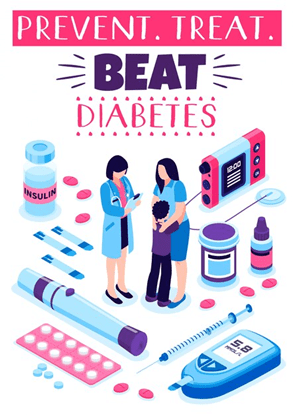Diabetes, a group of metabolic diseases characterized by high blood glucose levels, affects millions of people worldwide. While both men and women can develop diabetes, it’s essential to recognize that the impact of this condition can differ significantly between the sexes. In this blog post, we delve into how diabetes specifically affects women and explore the unique challenges they face.
- Symptoms in Women
Women and men with diabetes often share common symptoms, such as increased thirst, frequent urination, and fatigue. However, some symptoms are unique to women.
a. Candida Infections
Hyperglycemia (high blood sugar levels) can trigger the growth of the Candida fungus. An overgrowth of yeast caused by Candida can lead to vaginal or oral yeast infections. Symptoms include:
- Vaginal Itching
- Vaginal Discharge
- Painful Sex
- Soreness
Oral yeast infections may manifest as a white coating on the tongue and inside the mouth.
b. Urinary Tract Infections (UTIs)
Women with diabetes are at a higher risk of developing UTIs. Hyperglycemia compromises the immune system, making UTIs more common. Symptoms of UTIs include:
- Painful Urination
- Burning Sensation During Urination
- Bloody or Cloudy Urine
Untreated UTIs can even lead to kidney infections.
2) Pregnancy and Gestational Diabetes
Pregnancy introduces additional considerations for women with diabetes. Gestational diabetes occurs during pregnancy and requires careful management. Expectant mothers must monitor blood sugar levels closely to ensure the health of both themselves and their babies.
3) Cardiovascular Risks
Diabetes significantly impacts cardiovascular health. Women with diabetes face a higher risk of heart disease compared to men. In fact:
- Women experience a 13% greater risk of death from all causes related to diabetes.
- Their risk of death from cardiovascular disease is 30% higher.
- The risk of death from coronary heart disease is 58% greater for women with diabetes.
4) Sexual Health
Diabetes can affect sexual health in both men and women. For women, it may lead to:
- Reduced Interest in Sex
- Vaginal Dryness, which can make intercourse uncomfortable or painful
Factors contributing to sexual health issues include nerve damage, reduced blood flow, medications, and hormonal changes during pregnancy or menopause.
How can we deal with this issue
- Maintain a Healthy Weight:
- Weight management is crucial for preventing diabetes.
- Excess body weight increases insulin resistance and blood sugar levels.
- Recommendations:
- Engage in regular exercise for at least 150 minutes per week. Activities like brisk walking, swimming, or jogging are excellent choices.
- Focus on a balanced diet with whole foods: fruits, vegetables, whole grains, lean proteins, and healthy fats. Limit processed foods, sugary snacks, and high-calorie beverages.
- Practice portion control to avoid overeating.
- Stay Active:
- Physical activity impacts both weight management and blood sugar levels.
- Tips:
- Aim for at least 30 minutes of moderate-intensity exercise daily. Take the stairs, walk during breaks, or dance to your favorite tunes.
- Incorporate strength training exercises to build muscle mass and improve insulin sensitivity.
- Choose a Healthy Diet:
- Dietary choices significantly affect diabetes risk.
- Consider:
- Limiting carbohydrates: Reduce refined carbs and added sugars. Opt for whole grains, legumes, and non-starchy vegetables.
- Including fiber-rich foods: Oats, beans, and whole fruits help regulate blood sugar levels.
- Consuming healthy fats: Avocados, nuts, and olive oil have minimal impact on blood sugar.
- Avoid Smoking:
- Smoking increases diabetes risk and worsens complications.
- Quitting smoking is essential for overall health and diabetes prevention.
- Regular Health Checkups:
- Visit your healthcare provider regularly.
- Early detection of prediabetes allows timely intervention.
- Monitor blood sugar levels and follow your doctor’s recommendations.
6. Stress Management: Chronic stress impacts blood sugar regulation. Try stress-reducing techniques like meditation, yoga, or deep breathing exercises.
7.Stay Hydrated: Proper hydration supports overall well-being and helps maintain stable blood sugar levels. Remember to drink plenty of water throughout the day.
8. Prioritize Sleep: Quality sleep is crucial. Lack of sleep disrupts hormonal balance and may lead to insulin resistance.
9. Empower Yourself: Educate yourself about diabetes, its risk factors, and preventive measures. Knowledge empowers informed choices.
Always Remember, preventing diabetes is a journey. Small, consistent steps add up to significant improvements in your health. By adopting these practices, you’re investing in a healthier future for yourself.
Diabetes is a complex condition that affects everyone differently. For women, understanding the unique challenges they face allows for better management and improved overall health. Whether you’re a woman living with diabetes or supporting someone who is, knowledge and proactive care are key to thriving despite this metabolic disorder.
You’re not alone on this journey. Reach out to our healthcare providers, support groups, and loved ones to navigate the path toward better health and well-being.
If you are facing any kind of issues in the road of treating your diabetes,we are here to help you guys,reach out to our E-consultant.












